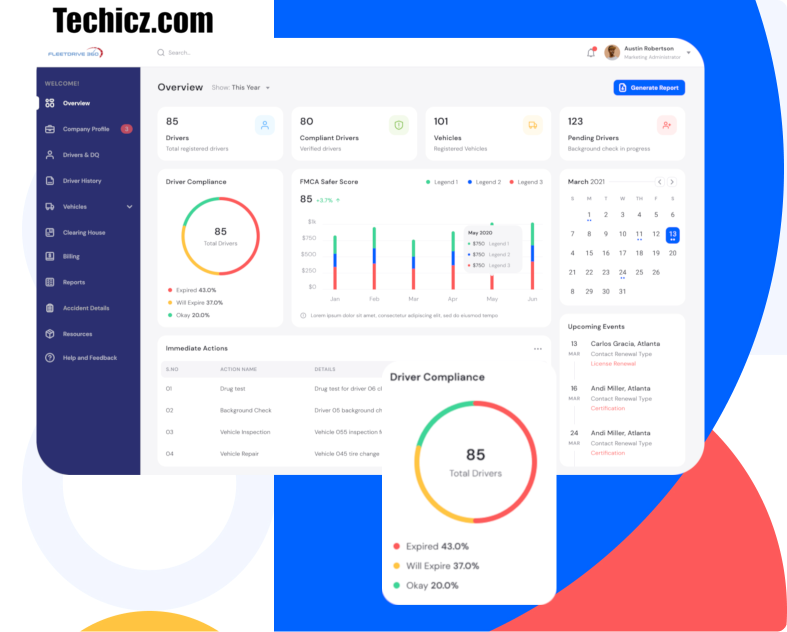
These cutting-edge technological solutions have revolutionized how businesses manage their vehicles and improve operational efficiency. Regardless of the size or type of fleet, from trucks delivering goods to buses transporting commuters, fleet management software provides an array of functionalities that streamline operations, ensure compliance, and enhance safety. Additionally, incorporating insights from an SEC regulatory advisory can help businesses in the financial sector ensure that their fleet management practices align with current financial regulations and standards, further safeguarding their operations and compliance. This article explores how fleet management software is reshaping the modern transportation landscape, enabling companies to optimize their resources, eliminate manual tasks, reduce costs, and ultimately achieve tremendous success in this highly competitive industry.
What Does Fleet Management Software Bring to Your Business?
It allows for real-time monitoring and tracking of vehicles, enabling businesses to have a clear overview of their fleet’s status and location. It helps improve operational efficiency by optimizing routes, reducing fuel costs, and minimizing delivery delays. Fleet management software offers geofencing and alert notifications, promptly informing managers about unauthorized vehicle usage or maintenance issues.
Another critical aspect that fleet management software brings to businesses is enhanced safety. With features like driver behaviour monitoring, businesses can track and analyze data on speeding, harsh braking, and other risky driving habits, enabling them to take proactive measures to promote safer driving practices and reduce accidents. Furthermore, the software provides valuable insights into vehicle maintenance and allows for automated scheduling of routine maintenance tasks, which helps prevent breakdowns and prolongs the lifespan of the vehicles. Businesses can minimize downtime and maximize productivity by ensuring that their fleet operates at optimal performance levels.
Fleet management software is a valuable tool that can significantly transform the way businesses in the transportation industry operate. Its ability to streamline operations, ensure compliance, and enhance safety makes it an essential asset for any company that relies on a fleet of vehicles. Embracing this innovative technology improves efficiency and productivity and keeps businesses competitive in the ever-evolving market.
Key Features of Effective Fleet Management Software
Effective fleet management software offers several key features for managing and optimizing a fleet. One of these features is real-time tracking and monitoring. With the help of GPS and other advanced technology, fleet managers can track their vehicles’ location, speed, and even condition in real time. It allows for better route planning, improved dispatching, and quicker response times in case of emergencies or customer demands.
Another vital feature of fleet management software is maintenance and repair management. This software can keep track of vehicle maintenance schedules, sending automated reminders when a service or inspection is due. It also allows seamless integration with repair shops and enables fleet managers to schedule repairs and monitor their progress. By proactively managing maintenance and repairs, fleet managers can reduce downtime, improve fuel efficiency, and extend the lifespan of their vehicles.
Effective fleet management software provides robust reporting and analytics capabilities. Fleet managers can generate detailed reports on fleet performance, such as fuel consumption, driver behaviour, and safety incidents. These insights help identify areas for improvement, make informed decisions, and ultimately, optimize the fleet’s operations and costs.
Addressing Common Challenges
One of the main challenges is optimizing fleet utilization and reducing operational costs. With the help of fleet management software, businesses can track and monitor their vehicles in real-time, allowing them to make informed decisions about route planning, vehicle maintenance, and fuel consumption. It not only ensures that resources are utilized efficiently, but it also reduces unnecessary expenses.
Another common challenge that fleet management software addresses is ensuring compliance with regulatory requirements. The transportation industry is heavily regulated, with strict guidelines on driver working hours, vehicle inspections, and safety standards. Fleet management software automates these processes, providing automatic alerts and reminders to meet all regulatory obligations. It not only helps businesses avoid penalties and fines but also contributes to creating a safer and more efficient transportation system.
Fleet management software enhances safety by providing comprehensive driver behaviour and performance data. It allows fleet owners to identify high-risk drivers, monitors speeding and harsh braking incidents, and implement training programs to improve driver safety. By addressing these common challenges, fleet management software has become an indispensable tool in the modern transportation industry, helping businesses streamline operations, minimize costs, and enhance overall safety and efficiency.
Also, Read About Unleashing the Power of Creativity in Software Development
